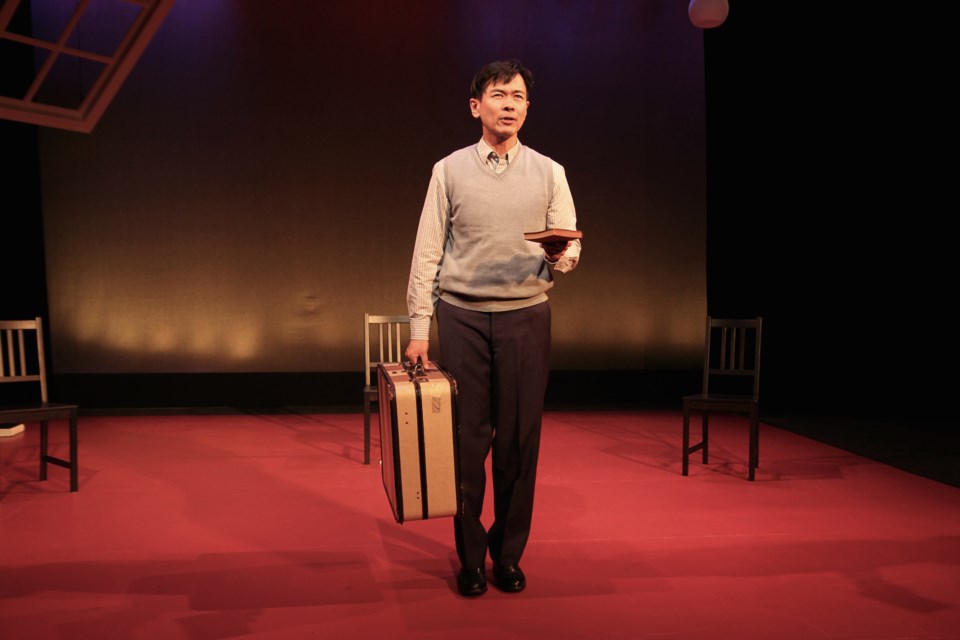Joel de la Fuente plays an inarguably nasty man on Amazon Prime’s The Man in the High Castle. The locally shot series — which is loosely based on the cult favourite novel by Philip K. Dick and kicks off its final season in November — presents an alternate version of history in which the Allies lost the Second World War and North America is now divided into the Greater Nazi Reich and the Japanese Pacific States.
De la Fuente’s character is Inspector Takeshi Kido, the cold and calculating head of the Japanese law enforcement machine, and he’s genuinely enjoyed every second he’s worn Kido’s wire-rimmed glasses and hunted down members of the Resistance.
But there’s another character that’s intrigued and nourished De la Fuente for even longer than Kido. And, unlike Kido, this character is based on a real person and inarguably a hero of the Resistance.
That real-life hero is Gordon Hirabayashi, and beginning this week, Â鶹´«Ă˝Ół»theatre audiences will finally have the chance to meet De la Fuente’s take on Hirabayashi in a one-man play entitled Hold These Truths. The play was written by Jeanne Sakata and follows Hirabayashi from a precocious five year old growing up in a Quaker community in Washington State to his principled resistance to Japanese American internment during the Second World War, and to the landmark court case that bears his name: .
“In the United States, I feel like everybody needs to know who Gordon is, and nobody does,” says De la Fuente. He’s played Hirabayashi in multiple productions of Hold These Truths and was nominated for a Drama Desk Award for Outstanding Solo Performance in 2013. “It’s a truly inspiring and remarkable story set in the darkest of times. Sadly, when have we ever needed to hear a story about such dark times as now?”
Hirabayashi was born in Seattle in 1918, and in 1942, he became one of three Japanese Americans to openly defy internment. He turned himself into the FBI and invited prosecution so that he could appeal it all the way to the U.S. Supreme Court. The court ruled against him, and he hitchhiked to prison in Arizona to serve 90 days.
Later, Hirabayashi spent a year in federal prison for refusing induction into the armed forces because he asserted that having to renounce allegiance to the Emperor of Japan was racially discriminatory.
Four decades after the war, when a political science professor uncovered evidence that the government knew back in 1942 that there was no military reason for the exclusion order, Hirabayashi’s case was reopened, and the Court of Appeals overturned his criminal conviction. Hirabayashi died in January 2012, and in May of that year, he was posthumously awarded the Presidential Medal of Freedom by President Barack Obama.
“What’s fun about this show is that Gordon looks like someone that so many people at that point of time thought were not heroes, and yet he’s heroic,” says De la Fuente.
That’s not a misprint: De la Fuente really did use the word “fun” when describing a show that delves into one of the (many) dark chapters in American history.
“There really is humour in this story,” he contends. “This show focuses on the personal, and Gordon was always surprisingly disarming. He was constantly coming up against people who thought they did and would dislike him and couldn’t help but be disarmed and charmed by this man who never saw himself as an activist. I think he saw himself as having principles, which were very clear to him. He was constantly disarming people with how much they had in common.”
It’s the kind of lesson that can’t be told in history books with any nuance, according to De la Fuente.
“In the theatre, you’re breathing shared air,” he says. “In the sharing of that, hopefully you’re mutually transported to a place of sharing where you share not just air but outrage, laughter, relief, and although everyone may have a slightly different reaction to things, you’re sharing it together.”
Hirabayashi’s story isn’t altogether unknown in Vancouver. It’s been central in several seminal works by Kokoro Dance, the iconic local butoh dance company that was co-founded in 1986 by Jay Hirabayashi, Gordon’s son.
This is why a portion of the proceeds from Hold These Truths’ ticket sales will benefit , as well as the Nikkei National Museum and Cultural Centre and the University of British Columbia’s Asian Canadian and Asian Migration Studies department.
Hold These Truthsis at the Cultch Oct. 20 to Nov. 2. Tickets and more information at .


